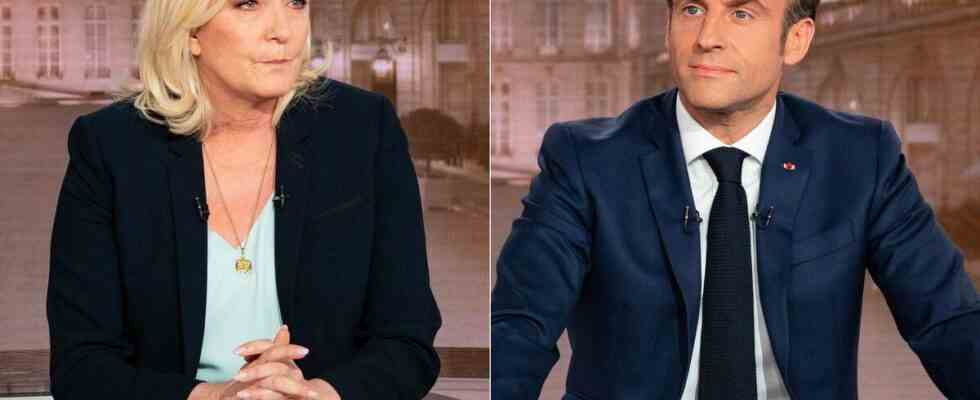This Wednesday evening, seven television channels will broadcast the duel between Emmanuel Macron and Marine Le Pen. The debate between the two rounds, an event at the end of the presidential campaign, has not changed much despite its fifty years of seniority, but continues to attract almost as many viewers as ever. “The French want to see the confrontation in itself. The spectacular side of this confrontation attracts, “says Jean Garrigues, historian and author of The Temptation of the Savior (ed. Payot).
This is the eighth such debate. We still have two candidates, still two journalists. Has this meeting changed?
The rules of the game are pretty much the same. Two journalists who arbitrate the two candidates, strictly controlled plans, subjects accepted in advance… Everything is settled in the same way as during the first debate in 1974. The rules of the game have changed very little. On the other hand, we can say that it has become a sort of almost unavoidable ritual, except in 2002 when Jacques Chirac felt that we could not discuss with a far-right candidate. But we have something immutable.
What do viewers expect from the debate?
The presidential election is the meeting between a candidate and a people. Even more than to understand in detail the programs of the candidates, the voters want to feel the personality of those who solicit their votes, the way in which they can react to attacks, the way in which they assume the qualities that can be attributed to a president of the Republic. It is a way to better understand the relationship that a candidate can have with his people. That said, what was exceptional in 1974 is trivialized. We see Emmanuel Macron and Marine Le Pen every day on the air on news channels, on social networks. This exceptional character that this duel had in the 70s has faded a little. The effect of novelty and exceptionality has greatly faded compared to that time.
Have these expectations changed in a period when political speech is highly staged?
There is a voyeuristic side cultivated by the evolution of the media. In a society where more and more media are focused on combat and confrontation, it is obvious that this is what feeds more and more the curiosity of viewers, perhaps more than the programs or projects of candidates. In 2017, there was the discovery of the two candidates that we knew very little about. The major curiosity of tonight’s duel is the way in which Marine Le Pen is going to correct what had been a kind of industrial disaster in 2017. It’s a real curiosity effect and it will undoubtedly be the common thread. How will she behave? Will she show more expertise and composure than five years ago? And, by extension, how will Emmanuel Macron adapt to a new, more peaceful Marine Le Pen? Will he not be destabilized by this stronger adversity? This is what makes the salt of this new confrontation.
To what extent is the debate part of the spectacle?
The French also want to see the confrontation in itself. The spectacular side of this confrontation attracts. It’s a bit like circus games. What we have retained from the televised duels are punchlines, replies which did not fundamentally change the opinion of voters but which marked people’s minds, starting with “you do not have a monopoly on heart”, from Valéry Giscard d’Estaing to François Mitterrand in 1974. There is always this agonistic dimension which attracts viewers. It is not necessarily what is highest in the democratic debate that really attracts.
The debate tonight should be calmer than that of 2017, therefore less conducive to striking expressions?
A priori, yes, the two candidates are in a dynamic of appeasement. Marine Le Pen wants to present another face and her behavior must be consistent with the campaign of rapprochement with the French that she has led. Emmanuel Macron, as outgoing president, will present himself in the posture of a great sage, nourished by the experience of the five-year term. Neither of the two has an interest, a priori, in jostling the other. What reinforces this idea is that everyone can consider that he has already won: Marine Le Pen finds himself again in the second round and has progressed in the voting intentions, Emmanuel Macron has overcome the crises he has faced. and scored better than predicted in the first round. Both candidates have reasons for satisfaction and are therefore rather inclined to a form of status quo during this duel. Except that there is always an eventuality that never happened. We can think that Marine Le Pen would have an interest in destabilizing Emmanuel Macron. If she could get him to make a mistake, maybe she could eventually reverse the order of things. It seems a bit complicated given the advance of Emmanuel Macron, it would even be completely new. In case he experiences the same type of industrial accident as Marine Le Pen in 2017, this could be a game-changer.
The debate should last 2h30, with inevitably more public at the beginning than at the end. Is it important for candidates to make an impression from the outset?
If it is a question of making an impression, that is to say of addressing one’s electorate in such a way as to retain it, the first hour is decisive. But with the help of fatigue, the gap fault can rather occur at the end of the debate. You have to remain absolutely vigilant throughout the duration because skidding is possible at any time. And especially, it seems to me, at the end. The striking little phrase is something more playable at the start of the duel. However, you have to be very careful. It seems to me that in 2017, it was also Marine Le Pen’s accumulation of fatigue that led her to go off the road, so you have to be vigilant until the end.

